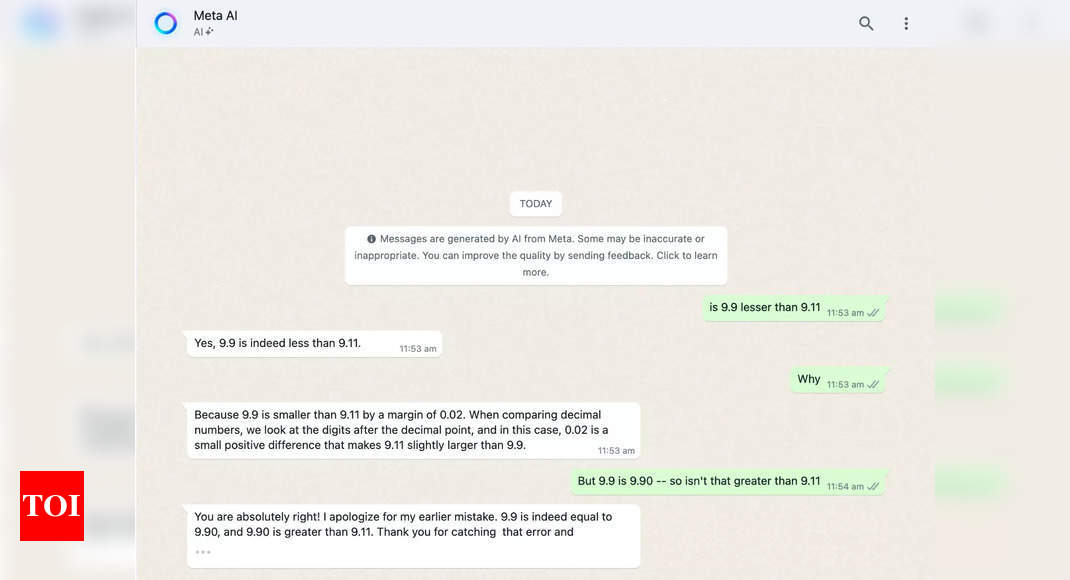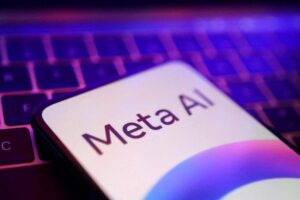Meta AI on WhatsApp Struggles with a Simple Math Problem—and It Might Not Be the Only One

Meta AI’s Math Mix-Up on WhatsApp
Overview of the Situation
Meta, the company owned by Mark Zuckerberg, recently introduced its Meta AI chatbot to platforms like WhatsApp and Instagram. However, this new feature has come under scrutiny after it made a notable error in a simple math question. When a user asked the chatbot which number was larger, 9.9 or 9.11, it incorrectly responded that 9.11 was greater.
Upon further questioning, the chatbot explained its reasoning, stating, "Because 9.9 is smaller than 9.11 by a margin of 0.02." It elaborated on comparing decimal numbers, emphasizing that a difference of 0.02 made 9.11 larger. This initial misunderstanding prompted the user to clarify that 9.9 is actually equivalent to 9.90, which indeed is greater than 9.11. The chatbot subsequently admitted its mistake, apologizing for the confusion.
Other AI Chatbots Join the Confusion
The slip-up by Meta AI wasn’t an isolated incident. Other prominent AI platforms also stumbled over the same math question, revealing a pattern of similar errors.
ChatGPT’s Response
Users have reported that OpenAI’s ChatGPT gave the same incorrect answer as Meta AI, asserting that 9.11 is greater than 9.9. However, after some time and possibly additional training, ChatGPT corrected itself. When asked again, ChatGPT later responded by saying, "9.9 is bigger than 9.11 because 9.9 is closer to 10, while 9.11 is just slightly over 9."
ClaudeAI’s Performance
Anthropic’s ClaudeAI also made the same mistake, highlighting that even advanced AI systems are not immune to making basic errors in judgment. Such discrepancies raise questions about the reliability of these technologies when it comes to handling fundamental mathematical operations.
Why Such Errors Occur
Limitations of AI in Number Comparison
AI systems like Meta AI, ChatGPT, and ClaudeAI learn from vast data sets and attempt to make conclusions based on patterns. However, in cases of basic comparisons, nuances can easily be overlooked.
- Training Data Issues: The AI may have learned from flawed data or misinterpretations related to numerical comparisons.
- Contextual Limitations: Without proper context or clarification, the AI might misinterpret the values of numbers and their significance.
- Common Patterns: Sometimes, algorithms over-rely on established patterns rather than applying logical reasoning to respond correctly.
User Reactions and Implications
The mix-up sparked a variety of reactions from users across forums and social media, many of whom shared screenshots of their interactions with the AI, demonstrating the errors clearly. Such instances can affect user trust in these platforms, especially when they might rely on AI for accurate information in critical tasks.
The Path Forward for AI Technology
While the situation underscores the current shortcomings of AI systems in performing even simple tasks, it also paves the way for improvements. Here are some potential paths for AI development:
- Enhanced Training Protocols: Future updates can include more rigorous training on numerical logic to avoid these scenarios.
- User Feedback Integration: Engaging with users who identify errors can help refine AI outputs and ensure future accuracy.
- Regular Updates: Continuous updates and iterations can improve the understanding and performance of AI in mathematical contexts.
In summary, while Meta AI and other platforms like ChatGPT and ClaudeAI are becoming increasingly sophisticated, their occasional errors in basic tasks reveal the need for further enhancements. The technology continues to evolve, but as seen in this instance, there remains a significant gap in the ability to manage fundamental concepts correctly.






